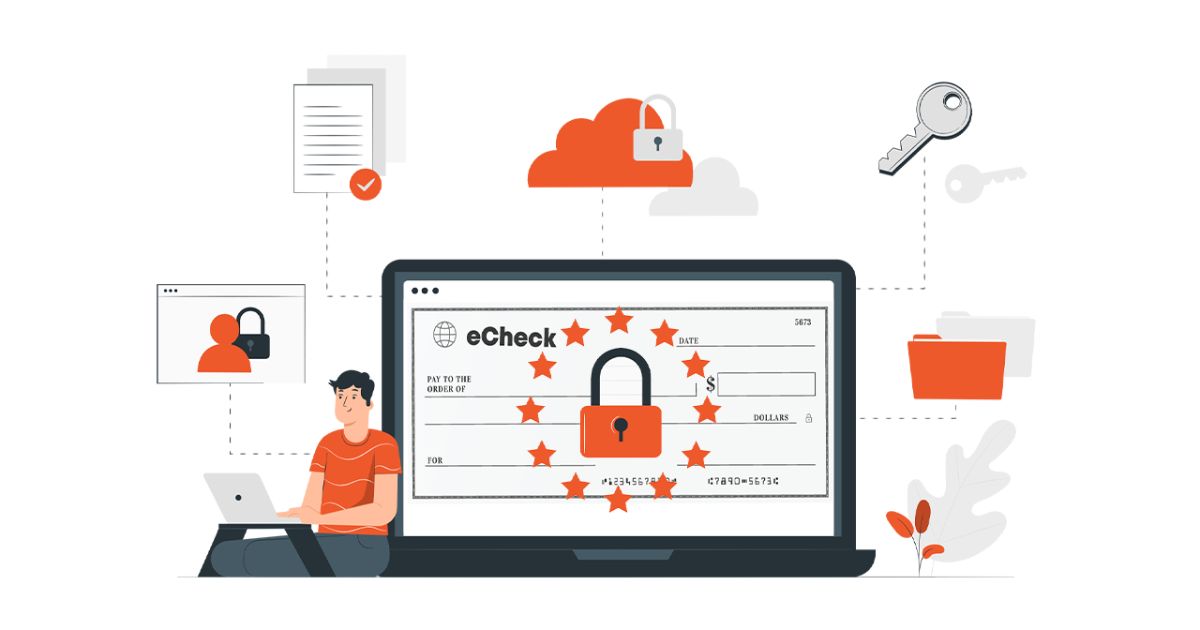
| November 27th, 2023 |
eCheck Security Measures — Protecting Your Financial Transactions!
In the fast-paced digital era, financial transactions have become more convenient, thanks to electronic checks or eChecks. These electronic versions of traditional paper checks offer a seamless and efficient way to transfer funds. However, as with any online financial activity, ensuring the security of eCheck transactions is paramount. In this blog post, we’ll delve into the key security measures you need to adopt to safeguard your financial transactions effectively.
Understanding eChecks — The Digital Evolution of Traditional Payments:
In the landscape of modern finance, electronic checks, or eChecks, have emerged as a digital counterpart to the conventional paper checks that have been a staple of financial transactions for decades. The transition from paper to electronic form brings forth a myriad of advantages, offering a seamless and efficient means of conducting transactions in the online realm.
An eCheck mirrors its paper counterpart in terms of content, encompassing crucial information such as the bank account number, routing number, payee details, and the specified amount to be paid. This digital transformation not only preserves the essential elements of a traditional check but also enhances the overall transaction process.
1. Convenience and Speed:
Unlike traditional checks that require physical handling and transportation, eChecks expedite the payment process through the power of digital communication. The instantaneous transfer of information enables quicker transaction processing, allowing for timely payments and reduced reliance on postal services.
2. Reduced Environmental Impact:
Embracing eChecks aligns with the global shift towards sustainability. By eliminating the need for paper, these electronic alternatives contribute to the reduction of deforestation and environmental degradation associated with traditional check production. Going digital is not just a convenience; it’s a step towards a more eco-friendly financial ecosystem.
3. Enhanced Record-Keeping:
One notable advantage of eChecks lies in the digital trail they leave behind. Each transaction is logged electronically, providing a comprehensive and easily accessible record of financial activities. This feature simplifies record-keeping for both individuals and businesses, streamlining the auditing process and minimizing the risk of human error associated with manual documentation.
4. Global Accessibility:
In an interconnected world, eChecks breaks down geographical barriers. Traditional checks often involve complex clearing processes and international transaction challenges. EChecks, on the other hand, facilitates global transactions with relative ease, promoting financial inclusivity and accessibility on a broader scale.
5. Integration with Digital Platforms:
The digital nature of eChecks aligns seamlessly with the broader digitalization of financial services. These electronic instruments easily integrate with online banking platforms, payment gateways, and other digital financial tools, fostering a cohesive and interconnected financial ecosystem.
6. Security Features:
While we will delve deeper into security measures shortly, it’s worth noting that eChecks often come equipped with advanced security features that go beyond the capabilities of traditional paper checks. Encryption, multi-factor authentication, and secure transmission protocols contribute to the overall safety and integrity of eCheck Payments.
The Importance of eCheck Security:
Given the sensitive information involved in eCheck transactions, robust security measures are crucial. Here are some key aspects to consider when aiming to protect your financial transactions:
1. Encryption Protocols:
Encryption acts as a virtual lock for your sensitive data. Reputable financial institutions employ advanced encryption protocols, such as SSL (Secure Sockets Layer) and TLS (Transport Layer Security), to secure the transmission of data between your device and its servers. Always ensure that the website or platform you are using for eCheck transactions employs these encryption technologies.
2. Multi-Factor Authentication (MFA):
Enhance your eCheck security by enabling multi-factor authentication. MFA adds an extra layer of protection by requiring additional verification steps beyond a password. This could involve a unique code sent to your mobile device or email, ensuring that even if your password is compromised, unauthorized access is significantly more challenging.
3. Secure Networks:
When initiating eCheck transactions, avoid public Wi-Fi networks. Opt for secure, password-protected networks to reduce the risk of unauthorized access. Using a Virtual Private Network (VPN) can also add an extra layer of security, encrypting your internet connection and keeping your data safe from prying eyes.
4. Regular Account Monitoring:
Stay vigilant by regularly monitoring your bank statements and transaction history. Promptly report any suspicious activity to your financial institution. The sooner you detect and report unauthorized transactions, the quicker your bank can take action to secure your account.
5. Up-to-Date Software:
Keep your devices and applications up to date with the latest security patches. Regularly update your operating system, antivirus software, and any applications related to your eCheck transactions. Software updates often include security enhancements that help protect against emerging threats.
6. Choose Reputable Service Providers:
Selecting a reputable financial institution or payment service provider is fundamental to eCheck security. Research and choose companies with a proven track record of implementing robust security measures. Look for certifications and compliance with industry standards to ensure the safety of your financial information.
7. Account Permissions and Alerts:
Check and set appropriate account permissions. Restrict access to sensitive functions and enable account alerts for any unusual activities. Many banks offer customizable alerts, notifying you of large transactions, low balances, or login attempts from unrecognized devices.
Conclusion:
Safeguarding eCheck Payments requires a multi-faceted approach that combines technical security measures with user diligence. Encryption, multi-factor authentication, tokenization, regular security audits, and partnering with reputable service providers collectively fortify the integrity of eCheck transactions against evolving cyber threats.
By implementing these security measures and adhering to best practices, individuals and businesses can instill confidence in their eCheck transactions, ensuring robust protection of their financial information in the digital realm.